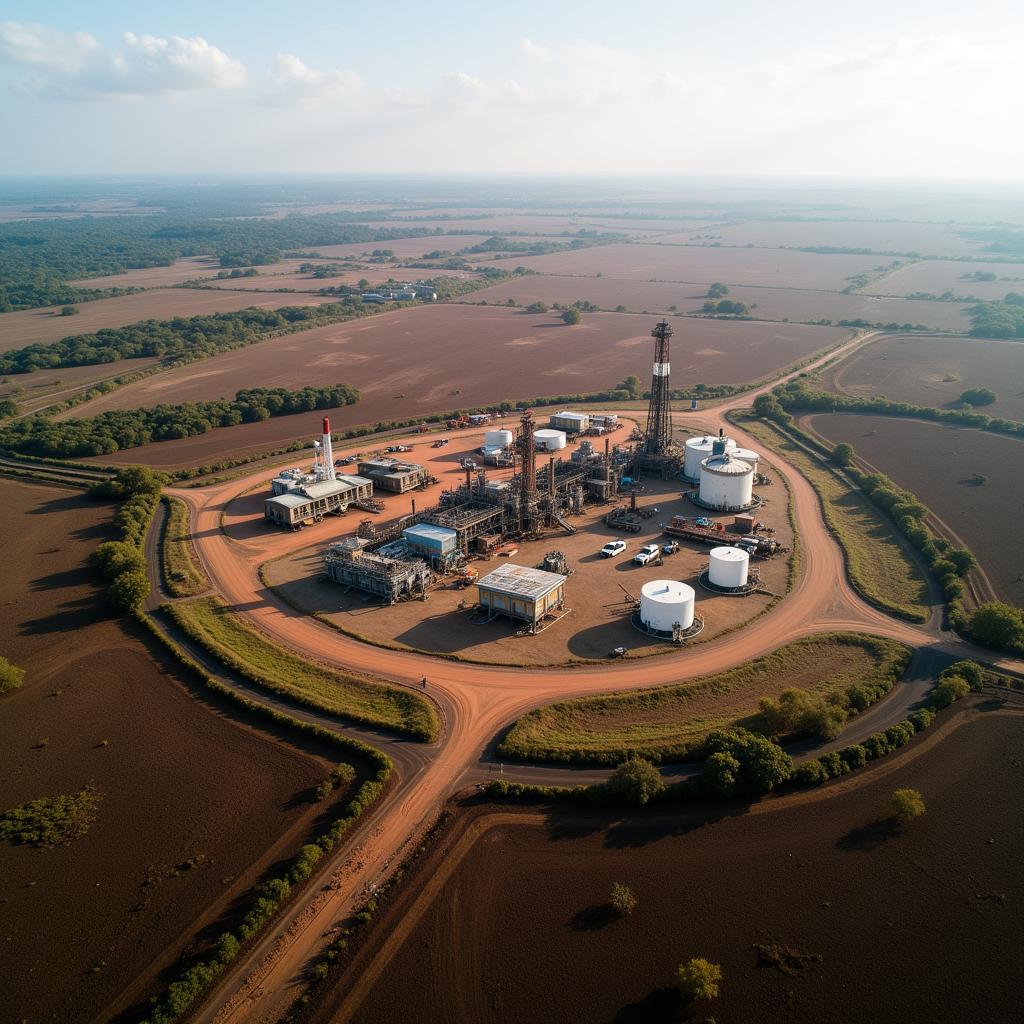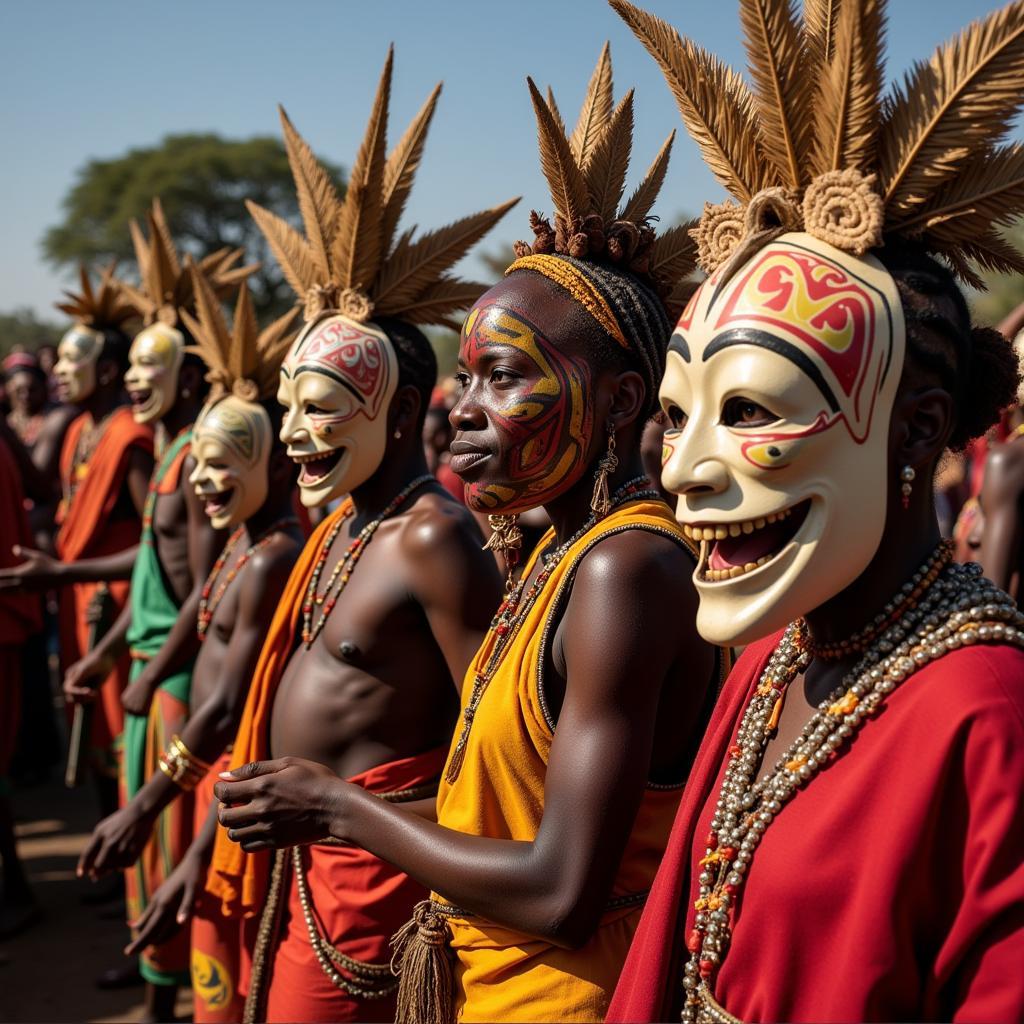African Countries with Natural Resources: A Wealth of Opportunity
Africa is a continent teeming with life, culture, and immense natural resources. From vast oil reserves to dazzling diamond deposits, African Countries With Natural Resources have long been coveted by nations worldwide. This abundance, however, is often intertwined with complex challenges, creating a landscape of both promise and hardship.
Let’s delve into the diverse world of African nations blessed with natural riches, exploring their economic significance and the complexities surrounding their sustainable development.
A Continent Abundant: Unveiling Africa’s Natural Wealth
 Oil Production in Nigeria
Oil Production in Nigeria
Africa’s natural resource wealth extends far beyond its iconic wildlife and breathtaking landscapes. The continent holds a significant portion of the world’s known reserves of various resources, including:
- Minerals and Metals: Africa holds a substantial portion of global reserves of key minerals like gold (South Africa), diamonds (Botswana), cobalt (Democratic Republic of Congo), and bauxite (Guinea). These minerals are essential components in various industries, ranging from electronics to construction.
- Fossil Fuels: Countries like Nigeria, Algeria, and Angola are major players in the global oil and gas industry, holding substantial reserves that fuel global economies.
- Timber and Forest Products: Central African countries, notably Cameroon and Gabon, possess vast tracts of rainforest, home to valuable timber species that contribute significantly to the global timber trade.
- Land and Agriculture: While often overlooked, Africa’s vast arable land presents significant potential for agricultural development. Countries like Ethiopia and Sudan, with their fertile lands, are poised to become major agricultural players on the global stage.
The Economic Engine: Natural Resources and African Economies
Natural resources play a pivotal role in the economies of many African nations. They serve as crucial sources of:
- Government Revenue: Revenue generated from resource extraction, often through taxes and royalties, provides vital funding for governments to invest in infrastructure, education, and healthcare, fostering economic development and improving livelihoods.
- Foreign Exchange Earnings: Exports of raw materials and natural resources generate significant foreign exchange earnings for many African countries, strengthening their positions in international trade.
- Employment Opportunities: The extraction and processing of natural resources create employment opportunities across various skill levels, contributing to economic growth and poverty reduction.
The Resource Curse: Navigating the Challenges
Despite the immense potential, the abundance of natural resources has, paradoxically, presented a unique set of challenges for many African countries. These challenges, often referred to as the “resource curse,” include:
- Price Volatility: Reliance on a single or limited number of resources makes economies vulnerable to fluctuations in global commodity prices, leading to economic instability.
- Environmental Degradation: Unsustainable extraction practices can have devastating impacts on the environment, leading to deforestation, pollution, and habitat loss.
- Conflict and Corruption: Competition for control over lucrative resources can fuel conflict and corruption, hindering development and exacerbating existing social and political tensions.
Towards a Sustainable Future: Harnessing Resources for Inclusive Growth
To overcome the resource curse and unlock the full potential of their natural wealth, African countries are increasingly focusing on:
- Diversification: Reducing reliance on a single resource by promoting economic diversification into sectors like manufacturing, tourism, and renewable energy.
- Value Addition: Moving beyond the export of raw materials by investing in processing and manufacturing industries to capture more value locally and create higher-paying jobs.
- Good Governance and Transparency: Strengthening institutions, promoting transparency, and combating corruption to ensure that resource revenues benefit all citizens.
- Sustainable Practices: Implementing environmentally responsible extraction and management practices to minimize negative impacts and preserve resources for future generations.
Conclusion: A Continent on the Rise
African countries with natural resources have the potential to become engines of global economic growth. By embracing sustainable practices, good governance, and economic diversification, these nations can harness their abundant natural wealth to drive inclusive development and create a brighter future for all Africans.

